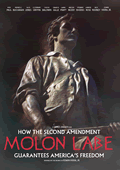Other
Emord
Articles:
Mandatory Vaccination is an
Assault on Individual Liberty
By Attorney Jonathan
Emord
Author of "The Rise of Tyranny" and
"Global Censorship of Health Information" and
"Restore The Republic"
February 9, 2015
NewsWithViews.com
Freedom of conscience, the freedom to believe as one would without interference from the state, is the hallmark of the First Amendment’s free exercise of religion clause, yet today forces of political correctness are redefining religious precepts as acts of discrimination or hate speech. The threat to liberty affects us all, regardless of our beliefs. As the Founding Fathers well knew, once the forces of censorship are unleashed by government for politically desired ends, there is a simultaneous death of liberty and birth of tyranny. Tolerance is the watch word for all and must be a constant if liberty is to survive.
If individual liberty is to be defensible for one, it must be equally defended for all. Thomas Jefferson expressed the American constitutional conception of liberty perhaps better than any other person before or since when he wrote to Benjamin Rush on April 21, 1803: “Of liberty I would say that, in the whole plentitude of its extend, it is unobstructed action according to our will. But rightful liberty is unobstructed action according to our will within limits drawn around us by the equal rights of others. I do not add ‘within the limits of the law,’ because law is often but the tyrant’s will, and always so when it violates the right of an individual.”
As Jefferson knew (and foresaw for America), law has frequently been bent to achieve acts that offend liberty in service either to a majority or to a political minority that has acquired the power to govern. The role of constitutional law is to correct the abuse, for courts to strike the offense by invalidating the law.
Today, across the country, laws defining hate speech and discrimination have been liberally construed such that churches and synagogues that adhere to the view that homosexuality is an abomination, consistent with Leviticus 18:22-23, have been deemed engaged in acts of discrimination or hate speech and ministers have been subject to prosecution. Through this means, for the first time, governments have imposed censorship on places of worship and have interfered with the free exercise of religion.
Judeo-Christian beliefs define as sinful a wide range of activities that occur without criminal sanction in modern society: including fornication, homosexuality, dishonesty, gluttony, adultery, abortion, lack of chastity, and disobedience to parents, just to name a few. So long as those beliefs fall within the Jeffersonian definition of liberty, bounded by the equal rights of others, they have long been defended against the state. While those of faith regard the acts as sinful, the constitutional law is not imposed against them but, rather, when such acts violate the rights of others, the law steps in to prevent the rights violation (not deny the right to believe the acts justifiable, regardless of how repugnant the viewpoint may be to those of religious scruples).
On the argument that any statement derogatory of homosexuality, even if articulated as a religious scruple, is an act of discrimination or is hate speech, some local authorities have filed charges against pastors and churches or Christian stores and bridal shops. They go too far. They are seeking to establish a secular orthodoxy over private religious institutions. They are seeking to establish a regime of censorship.
To hold a belief and to commune with like believers is a constitutional right protected as the free exercise of religion. Even if the beliefs held, or, more appropriately, especially if the beliefs held, offend others who do not share those beliefs, the First Amendment stands as a constitutional command that the state allow that profession of faith, even if the profession offends those who fornicate, engage in homosexual acts, lie, eat to excess, sleep with women other than their wives, abort fetuses, wear revealing attire, or defy their parents.
The First Amendment also stands as a defense for those who preach a secular creed favoring fornication, homosexuality, dishonesty, gluttony, adultery, abortion, unchaste attire, and youth rebellion. Never can we deny the one, those of religious scruples, their right to believe as they wish and preach as they think fit, in favor of legal protection for the other, those who lack such scruples. Never can we deny the other, those of other religious scruples or who oppose religious scruples, their right to believe as they wish and preach as they think fit. Rather, all must be tolerated, allowed to congregate among like minded, and allowed to preach their religious or secular conceptions if freedom, if the Jeffersonian conception of liberty that underlies our Bill of Rights, is to survive.
That is not to say that if a place of public accommodation, a hotel, a housing development, a bus service, or a public school wishes to exclude those who hold a certain belief, they may do so on the basis of their own view against it. To the contrary, places of public accommodation may not engage in acts of discrimination against identified minorities precisely because they then transgress the realm of freedom by entering the public domain and depriving others of their equal right to that accommodation. But if Catholics wish to congregate only with other Catholics who subscribe to the view that abortion is a sin, birth control is a sin, and homosexuality is a sin, of if they wish to exclude from the priesthood a doctor who aborts fetuses or a person who is sexually active, that is their right within a private religion or private association. Such places are not those of public accommodation, and the balance shifts markedly in favor of protecting not only the one who holds a religious scruple of one kind or another but also the group that so holds.
The law may not compel private churches, associations, and even private businesses not of public accommodation that are established as a service among a community of like believers to abandon beliefs on the grounds that some may be offended by those beliefs, but that is not to say if those who believe in ways that cause them to oppose practices that are otherwise legal may then commit crimes in the name of those scruples against others and not be arrested, prosecuted, incarcerated, and otherwise punished.
Equal justice under law, to which we are all equally entitled, demands that laws be stricken for depriving one of life, liberty, and property on the basis of discrimination. So, for example, if a public school fires a teacher because he or she is, for example, gay, a Jew, or a Catholic, that action is one of discrimination actionable against the school. The public school is a place of public accommodation, and is an instrument of the state, which cannot favor one viewpoint over another.
If, however, the school has a policy in place that forbids communication of a teacher’s sexual preferences to the students, without regard to that teacher’s sexual orientation, and a heterosexual or gay teacher describes his or her love life to students and is fired, that would be a constitutional act so long as the prohibition is imposed without regard to viewpoint.
|
|
In short, states and localities transgress constitutional limits and imperil all of our freedom when they seek to impose on private institutions and churches an orthodoxy that constrains the views that may be held. We are all free not to join such institutions, to profess and unite among those who likewise profess views to the contrary, but we are not free to impose legal limits on the freedoms of others, regardless of how repulsive the viewpoint is to us. Tolerance remains the order of the day. We must tolerate the private associations we dislike, so long as we are free to associate differently. As soon as law becomes an enemy of tolerance, for example by banning religious views of one kind or another or by banning private associations of one kind or another that are, in and of themselves, of no consequence to the equal rights of others, we have erected a tyranny that, in the end, can be imposed upon any one of us.
Click here to visit NewsWithViews.com home page.
© 2015 Jonathan W. Emord - All Rights Reserved
Jonathan W. Emord is an attorney who practices constitutional and administrative law before the federal courts and agencies. Ron Paul calls Jonathan “a hero of the health freedom revolution” and says “all freedom-loving Americans are in [his] debt . . . for his courtroom [victories] on behalf of health freedom.” He has defeated the FDA in federal court a remarkable eight times, seven on First Amendment grounds, and is the author of the Amazon bestsellers The Rise of Tyranny, Global Censorship of Health Information, and Restore the Republic. He is the American Justice columnist for U.S.A. Today Magazine and joins Robert Scott Bell weekly for “Jonathan Emord’s Sacred Fire of Liberty,” an hour long radio program on government threats to individual liberty. For more info visit Emord.com, join the Emord FDA/FTC Law Group on Linkedin, and follow Jonathan on twitter (@jonathanwemord).
Website: Emord.com
E-Mail: jemord@emord.com
Freedom
of conscience, the freedom to believe as one would without interference
from the state, is the hallmark of the First Amendment’s free
exercise of religion clause, yet today forces of political correctness
are redefining religious precepts as acts of discrimination or hate
speech.















 Share This Article
Share This Article







